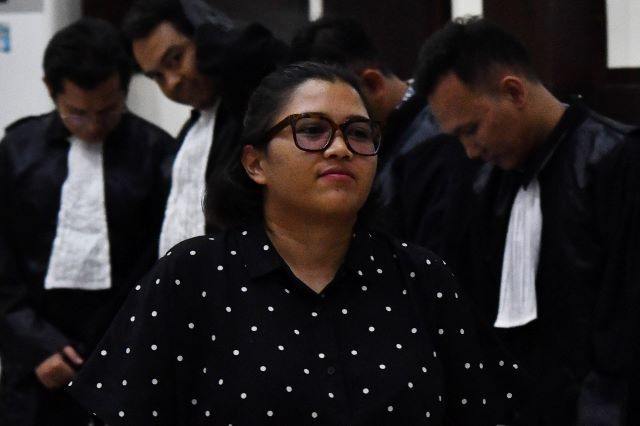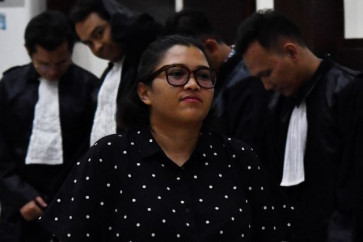Popular Reads
Top Results
Can't find what you're looking for?
View all search resultsPopular Reads
Top Results
Can't find what you're looking for?
View all search resultsCriminalization of disinformation threatens freedom of expression
As a state party to the International Covenant on Civil and Political Rights (ICCPR), Indonesia is obliged to respect and ensure the right to freedom of expression and information.
Change text size
Gift Premium Articles
to Anyone
 Free speech on trial: Commission for Missing Persons and Victims of Violence (KontraS) coordinator Fatia Maulidiyanti (center) leaves the courtroom after a hearing on Nov. 13, 2023 at the East Jakarta District Court. State prosecutors are demanding a three-year prison sentence for Fatia for her alleged defamation of Coordinating Maritime Affairs and Investment Minister Luhut Binsar Pandjaitan. (Antara/Fakhri Hermansyah)
Free speech on trial: Commission for Missing Persons and Victims of Violence (KontraS) coordinator Fatia Maulidiyanti (center) leaves the courtroom after a hearing on Nov. 13, 2023 at the East Jakarta District Court. State prosecutors are demanding a three-year prison sentence for Fatia for her alleged defamation of Coordinating Maritime Affairs and Investment Minister Luhut Binsar Pandjaitan. (Antara/Fakhri Hermansyah)
O
ver the past two decades, state authorities have tightened their grip on online freedom of expression in the country by enacting and applying overbroad laws purportedly aimed at legitimate objectives such as combating disinformation, but with the effect of arbitrarily censoring expression and targeting journalists and human rights defenders.
Among these are criminal provisions against intentional dissemination of harmful “false information”, i.e. disinformation. One such provision is Article 14(1) of Law No. 1/1946 on criminal law regulations, which criminalizes the act of “intentionally broadcasting false news or statements that incite chaos in society”, which may result in 10 years’ imprisonment.
Civil society organizations have rightly pointed out that the 1946 law and other disinformation laws inherited from the colonial justice system should not be applied in current times. In July 2023, a petition was filed with the Constitutional Court by several human rights organizations claiming that the disinformation provisions in Law No. 1/1946 contravene the state’s obligation to protect the right to freedom of expression and information.
Disinformation laws have frequently been enforced to restrict freedom of expression. Muhammad Asrul, a journalist, was charged in 2021 under Article 14(1) of Law No. 1/1946 for a piece detailing the alleged involvement of the son of the Palopo mayor in a corruption scandal. Human rights defenders Haris Azhar and Fatia Maulidiyanti are standing trial on charges relating to the criminal disinformation provisions of the same law in relation to a YouTube video discussing allegations of a conflict of interest by the Coordinating Maritime and Investment Affairs Minister Luhut Pandjaitan.
As a state party to the International Covenant on Civil and Political Rights (ICCPR), Indonesia is obliged to respect and ensure the right to freedom of expression and information, as guaranteed under Article 19 of the ICCPR. As affirmed by the United Nations Human Rights Committee, the monitoring body for the ICCPR, this right forms the “foundation” of a free society in ensuring the “transparency and accountability” crucial to the promotion and protection of many other rights.
Any restriction of this right must be based on a law that is precisely worded. Further, it must be necessary for and be the least restrictive measure to respond to a legitimate aim. The only aims identified as legitimate are ensuring respect for the rights or reputations of others; or for the protection of national security, public order, public health or morals.
The criminal disinformation provisions of Law No. 1/1946 by no means meet the above standards. The use of the term “false news or statements” in the criminal disinformation provisions of the law is vague, overbroad and imprecise, as the lines between facts and opinions, and truth and falsehoods can be notoriously difficult to draw.


















